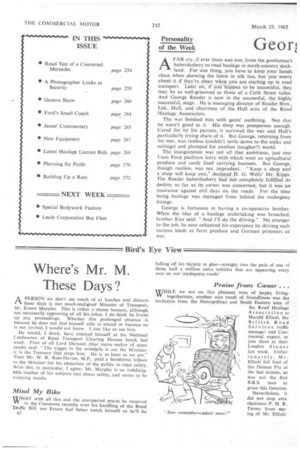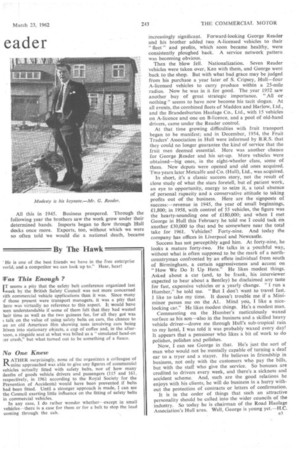Personality of the Week
Page 36

Page 37

If you've noticed an error in this article please click here to report it so we can fix it.
Geon
eader
AFAR cry, if ever there was one, from the gentleman's haberdashery to road haulage in north-country dockland. For one thing, you have to keep your hands clean when showing the latest in silk ties, but you worry about it if they're. clean when you are starting up in road transport. Later on, if you happen to be successful, they may be as well-groomed as those of a Cork Street tailor. And George Reader is now in the successful, the highly successful, stage. He is managing director of Reader Bros., Ltd., Hull, and chairman of the Hull area of the Road Haulage Association.
The war finished him with gents' outfitting. Not that he wasn't good at it. His shop was prosperous enough. Cared for by his parents, it survived the war and Hull's particularly trying share of it. But George, returning from the war, was restless (couldn't settle down to the socks and suitings) and plumped for another (tougher?) world. .
The inauguration was not all that ambitious, just one 5-ton Ford platform lorry with which went an agricultural produce and cattle food carrying business. But George, though restless, was not imprudent. "Keep a shop and a shop will keep you," declared H. G. Wells' Mr. Kipps. The Reader haberdashery had not completely fulfilled its destiny so far as its °Wrier was concerned, but it was an insurance against evil days on the roads. For the time being haulage was managed from behind the mahogany fittings.
George is fortunate in having a co-operative brother. When the idea of a haulage undertaking was broached, brother Ken said: "And I'll do the driving." No stranger to the job, he now enhanced his experience by driving such various loads as farm produce and German prisoners of war.
• All this in 1945. Business prospered. Through the following year the brothers saw the work grow under their determined hands. Imports began to flow through Hull docks once more. Exports, too, without which we were so often told we would die a national death, became increasingly significant. Forward-looking George Reader and his brother added two A-licensed vehicles to their " fleet " and profits, which soon became healthy, were consistently ploughed back. A service network pattern was becoming obvious.
Then the blow fell. Nationalization. Seven Reader vehicles were taken over, Ken with them, and George went back to the shop. But with what bad grace may be judged from his purchase a year later of S. Cripsey, Hull—four A-licensed vehicles to carry produce within a 25-mile radius. Now he was in it for good. The year 1952 saw another buy of great strategic importance. "All or nothing" seems to have now become his tacit slogan. At all events, the combined fleets of Maddox and Harlow, Ltd., and the Brandesburton Haulage Co., Ltd., with 15 vehicles on A-licence and one on B-licence, and a pool of old-hand drivers, came under the Reader control.
At that time growing difficulties with fruit transport began to be manifest; and in December, 1954, the Fruit Traders' Association in Hull were informed by B.R.S. that they could no longer guarantee the kind of service that the fruit men deemed essential. Here was another chance for George Reader and his set-up. More vehicles were obtained—big ones, in the eight-wheeler class, some of them. New depots were opened and old ones acquired. Two years later Metcalfe and Co. (Hull), Ltd., was acquired.
In short, it's a classic success story, not the result of close study of what the stars foretell, but of patient work, an eye to opportunity, energy to seize it, a total absence of personal rapacity and a conservative attitude to taking profits out of the business. Here are the signposts of success:—revenue in 1945, the year of small beginnings, £1,800; in 1958, with control of 55 vehicles, the figure was the hearty-sounding one of £180,000; and when I met George in Hull this February he told me I could tack On another £30,000 to that and be somewhere near the total take for 1961. Vehicles? Forty-nine. And today the company has offices in Liverpool and Newcastle.
Success has not perceptibly aged him. At forty-nine, he looks a mature forty-two. He talks in a youthful way, without what is often supposed to be the mark of a northcountryman confronted by an effete individual from south of Birmingham, a certain aggressiveness and accent on "How We Do It Up Here." He likes modest things. Asked about a car (and, to be frank, his interviewer expected to hear about a Bentley) he disclaimed any taste for fast, expensive vehicles or a yearly change. "I run a Humber," he told me. "But I don't want to travel fast. I like to take my time. It doesn't trouble me if a Miniminor passes me on the Al. Mind you, I like a nicelooking car." He likes modest things. He's a modest man.
Commenting on the Humber's meticulously waxed surface as his son—also in the business and a skilled heavy vehicle driver—drove me through Hull's sub-tropical rain to my hotel, I was told it was probably waxed every day! It appears that a pensioner who likes a bit of work to do polishes, polishes and polishes.
Now, I can see George in that. He's just the sort of man who would not be mentally capable of turning a deaf ear to a tryer and a stayer. He believes in friendship in business, not only with the customers who pay the bills, but with the staff who give the service. So bonuses are credited to drivers every, week, and there's a sickness and accident scheme. And, such are the good relations he enjoys with his clients, he will do business in a hurry without the protection of contracts or letters of confirmation.
It is in the order of things that such an attractive personality should be called into the wider councils of the industry. So today he is chairman of the Road Haulage Association's Hull area. Well, George is young yet.—H.C.




















































































































